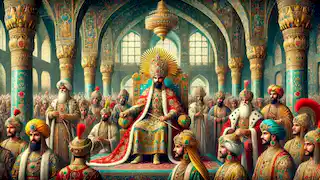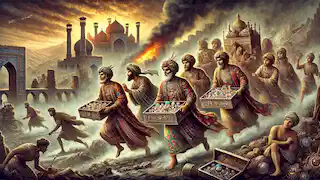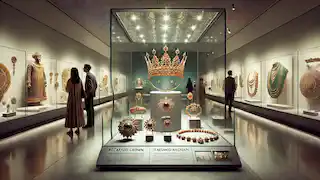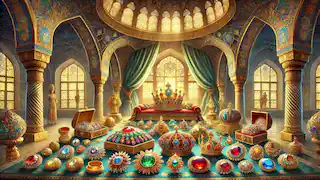The glittering legacy of the Sassanid Empire (224–651 CE), one of the most powerful dynasties of ancient Persia, is embodied by its fabled crown jewels. These treasures, amassed over centuries of conquest and trade, are a testament to the grandeur, sophistication, and artistry of an empire that ruled much of the known world. From the intricately crafted crowns of Sassanid monarchs to the luminous gems adorning royal artifacts, the jewels were symbols of divine kingship, cultural refinement, and unmatched wealth. This is the story of those extraordinary treasures. The Sassanid Empire's foundation by Ardashir I in 224 CE marked a resurgence of Persian culture and influence after the fall of the Achaemenid Empire. Its rulers, ambitious and visionary, envisioned their empire as the center of the world, and their crown jewels were not merely ornamental but deeply symbolic. Representing the divine favor bestowed upon the monarchs, these jewels played a central role in state ceremonies, religious rituals, and diplomatic exchanges. The crown jewels were housed in the imperial treasury, known as the "Ganjaraya." Over time, the collection grew to include diamonds from India, emeralds from Egypt, sapphires from Sri Lanka, and pearls from the Persian Gulf, along with countless artifacts crafted by master artisans. Unlike mere decorative items, the Sassanid crown jewels were deeply integrated into the empire's social and political fabric. They were a visible expression of the king's divine authority, serving as both a reminder to his subjects and a statement to foreign dignitaries. One of the most famous artifacts in this collection was the Kiani Crown, a bejeweled masterpiece encrusted with an array of dazzling gemstones. It was believed to be imbued with celestial energy, symbolizing the monarch's divine right to rule. Each gem in the crown had its own meaning, with emeralds symbolizing fertility and wisdom, rubies signifying power, and pearls representing purity. Similarly, necklaces, armlets, and rings were adorned with inscriptions, miniature carvings, or religious motifs that connected the wearer to the Zoroastrian god Ahura Mazda. The jewels were not just objects of beauty; they were conduits of spiritual and cultural identity. The fall of the Sassanid Empire to the invading Arab forces in 651 CE marked the beginning of a dark chapter for its crown jewels. As the empire collapsed, the Ganjaraya treasury was plundered, and many of its treasures were lost to history. Some jewels were taken to the Islamic Caliphate, adorning the courts of the Umayyad and Abbasid dynasties. Others disappeared into private collections, leaving behind only tantalizing traces. However, tales of hidden caches persisted for centuries. According to legend, some Sassanid nobles, fleeing the Arab invasion, buried portions of the royal treasury in secret locations, hoping to preserve their heritage. Archaeological discoveries across Iran have occasionally unearthed fragments of Sassanid artifacts, hinting at the possibility that some of these legendary treasures might still lie hidden beneath the earth. The modern era has brought renewed interest in uncovering the secrets of the Sassanid crown jewels. Excavations at ancient sites such as Ctesiphon, the former Sassanid capital, have revealed intricate goldwork, gem-encrusted artifacts, and other remnants of the empire's wealth. For instance, a spectacular gold necklace unearthed in the 20th century features motifs of Zoroastrian iconography, with sapphire and garnet inlays reflecting the artistry of Sassanid craftsmen. Similarly, intricate silver plates depicting royal hunts have been found, some inlaid with semi-precious stones that once formed part of the imperial treasury. The study of these artifacts provides valuable insights into the empire's trade networks, cultural practices, and artistic traditions. It also reaffirms the enduring legacy of Sassanid craftsmanship, which influenced Islamic art and architecture in the centuries that followed. The Sassanid crown jewels left an indelible mark on the cultures that succeeded them. Their influence can be seen in the design of Islamic jewelry, which adopted many Sassanid techniques and motifs. The intricate patterns and use of colorful gemstones became a hallmark of Persian and Islamic art. Furthermore, the jewels also played a role in shaping Western perceptions of Persia. Stories of the Sassanid treasures, embellished over time, captured the imagination of medieval European writers, fueling romanticized depictions of Persia as a land of immense wealth and mystique. Today, the legacy of the Sassanid crown jewels lives on in the cultural heritage of Iran. Museums such as the National Museum of Iran showcase some of the artifacts recovered over the years, offering visitors a glimpse into the splendor of the ancient empire. While much of the original collection remains lost, the spirit of Sassanid artistry endures in the craftsmanship of modern Iranian jewelers, who draw inspiration from their imperial predecessors. Efforts to locate the lost treasures continue, driven by advancements in technology and a growing interest in preserving historical artifacts. Scholars and archaeologists alike hope that the secrets of the Sassanid crown jewels will one day be fully uncovered, shedding light on one of the most fascinating chapters of Persian history. The story of the Sassanid crown jewels is one of splendor and mystery, triumph and loss. These treasures not only symbolized the grandeur of an empire but also encapsulated its spiritual, cultural, and artistic essence. Though many of the jewels remain lost to history, their legacy continues to inspire awe and curiosity. They remind us of a time when Persia was a beacon of civilization, a testament to the enduring allure of its ancient heritage.A Glimpse into Sassanid Grandeur

The Role of the Crown Jewels in Sassanid Culture
The Mystery of the Lost Treasures

Rediscovery Through Archaeology
The Cultural Impact of the Crown Jewels

The Legacy of the Sassanid Crown Jewels Today

Conclusion
The Story of the Sassanid Crown Jewels
Reading Time: 5 min

About Story: The Story of the Sassanid Crown Jewels is a Historical Fiction Stories from iran set in the Ancient Stories. This Descriptive Stories tale explores themes of Wisdom Stories and is suitable for All Ages Stories. It offers Historical Stories insights. The lost treasures of Persia's golden age and their enduring legacy.

















